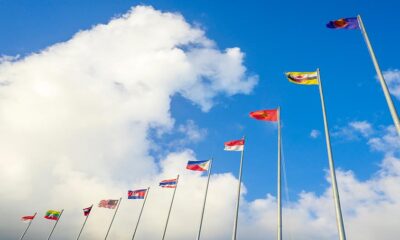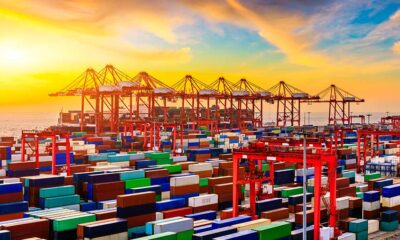China
Renowned HK actor laments China’s censorship hurts creativity

Hong Kong film legend Chow Yun-fat has conceded that the city’s film industry – on the decline from its heyday – has no freedom, and creativity was at the mercy of China’s censorship requirements.
A movie script is subject to multiple departments and layers of approval, Chow told the press at South Korea’s Busan International Film Festival on Thursday.
“We have a lot of restrictions now. It is very difficult for Hong Kong filmmakers. But we will try our best to make movies with the Hong Kong spirit. This is our goal.”
Chow is the first prominent figure in the industry to speak out publicly against the Chinese film approval system. He was named Asian Filmmaker of the Year at the Busan festival.
Once the trend setter in Asian entertainment and films, way before South Korea’s K-pop and movies grabbed the world’s attention, the Hong Kong film industry is dying a slow death, battling first with piracy and then competition from capital-rich China which has lured some of its best talent.
At the same time, Beijing’s tightened controls on free speech and expression have crimped creativity, as most, if not all, productions depended on investments from China and for a commercial release in the world’s second-largest economy.
Hong Kong’s box office receipts in the first half of this year totaled HK$771.9 million (US$98.56 million), according to the Hong Kong Motion Picture Industry Association. The figure is less than 3% of the 26.3 billion yuan (US$3.7 billion) that Chinese cinemas have raked in for the six-month period, based on data from the China Film Administration.
“Somehow, up to 1997 … a lot of different things changed,” Chow said. “We have to pay attention to our government, the direction, where we have to go. You know, this is important. Otherwise, it’d be very hard to get the money to build up a story and shoot the movie. Because the mainland China market is so huge, so we are trying [out] some solutions – to make a living.”
No ghosts or dirty cops
In the 20 years since the Mainland Hong Kong Closer Economic Partnership (CEPA) was signed, the Hong Kong-China model in filmmaking has become a mainstay, which means the script also has to be vetted by the Chinese authorities before filming can commence.
Tin Kai Man, chairman of the Federation of Hong Kong Filmmakers told Radio Free Asia that joint productions inevitably need to meet “national conditions” – no sex, ghosts and monsters, as well as dirty cops content – in order to be released in China.
“Hong Kong [authorities] wouldn’t kill your movies, or ban them. At most, they’d ask for certain cuts to be made. The Chinese system is different. If you want to make a film, you need to first finish the script, get approval to film, and then submit to the China Film Administration to vet, to obtain the so-called dragon seal,” Tin said.
Meanwhile, actor Chow said every film market has its golden age. The 1980s and 1990s are touted as the golden age of Hong Kong cinema, and Chow said the spotlight is now on Korean films – South Korea not only has the creative freedom that his city lacks, but the movies are also recognized by Hollywood.
“Why Korean shows are good is because the range of the topics is huge. Perhaps because of the [Korean] government’s support and the wide freedom, the thinking of creators is broad,” he said. “I’m surprised at so many themes – woah, they are brave to make such films. I think they have unlimited imagination, strong creativity. The films are good; I’m happy and excited about them.”
Chow entered the industry in 1973. He first found fame in television in the 1970s and 1980s, before moving on to the big screen. Over the past 50 years, he has created many classic films, which helped propel Hong Kong to the status of Asia’s Hollywood. He also successfully broke into Hollywood with a number of films like “Anna and the King,” “Crouching Tiger, Hidden Dragon,” and “Pirates of the Caribbean: At World’s End.”
Translated by RFA Cantonese. Edited by Taejun Kang and Mike Firn.
Read the rest of this article here >>> Renowned HK actor laments China’s censorship hurts creativity
Business
Business Update: Southern Sun Reports Earnings Growth; China Stimulates Property Market – News24

Southern Sun reports increased earnings, attributed to growth in the hospitality sector, while China’s property market receives a boost, reflecting economic recovery and renewed investor confidence.
Southern Sun Earnings Surge
Southern Sun has reported a significant increase in its earnings, showcasing solid financial performance amid evolving market conditions. This growth highlights the company’s resilience and adaptability to changing consumer demands, positioning it well for future opportunities in the hospitality industry.
China’s Property Market Recovery
In a bid to rejuvenate its economy, China has introduced measures to boost its property market. These initiatives aim to stabilize real estate prices and encourage investment, which is crucial for maintaining economic momentum. The government’s commitment to supporting the sector reflects its understanding of the industry’s importance in overall economic health.
Broader Economic Implications
The rise in Southern Sun’s earnings and China’s proactive approach to revitalizing its property market indicate broader economic trends. Investors and stakeholders are keenly observing these developments, as they may signal recovery and growth opportunities in both the hospitality and real estate sectors. The collaboration between local businesses and governmental actions will be pivotal in shaping future economic landscapes.
Source : Business brief | Southern Sun sees earnings rise; China boosts its property market – News24
China
Vietnam’s Approach to China: A Balance of Cooperation and Struggle
Vietnam’s diplomatic strategy seeks a balance of cooperation and struggle with China, focusing on strengthening ties while resisting encroachments in the South China Sea through military enhancements and regional partnerships.
Vietnam’s Diplomatic Strategy
Vietnam’s diplomatic approach seeks to maintain a delicate balance between cooperation and struggle with China. While concerned about China’s growing influence, particularly in the South China Sea, Hanoi focuses on strengthening its economic and political ties. This effort involves military enhancements, fostering relationships with regional powers, and engaging in frequent political dialogues. By skillfully navigating relations with major powers, Vietnam aims to protect its sovereignty and foster stability amidst evolving geopolitical dynamics.
Recent Developments and Implications
Hanoi’s diplomatic maneuvering has drawn attention, particularly regarding key visits like Vietnamese Communist Party General Secretary To Lam’s August 2024 trip to China. Although there are apprehensions about a potential shift in Vietnam’s alignment due to To Lam’s background in public security and his anti-corruption initiatives, it is premature to predict any significant changes in policy. Vietnam’s leaders must continuously seek a balance between peaceful coexistence with China and safeguarding national sovereignty.
Economic Interdependence and Military Modernization
Vietnam’s strategy involves fostering economic interdependence with China while simultaneously resisting encroachments. This paradigm of “cooperation and struggle” enables Hanoi to cultivate beneficial ties in economic, political, and security domains. By leveraging its geographical advantage and connections, Vietnam enhances its economic ties while countering threats through military modernization and cooperation with regional partners. This nuanced approach allows Vietnam to welcome trade, particularly amidst shifting dynamics from the US-China trade war, ensuring continued foreign direct investment and growth in key sectors.
Source : Cooperation and struggle define Vietnam’s approach to China
China
2025 Schedule of Public Holidays in China

China’s 2025 public holiday schedule increases holidays by two days, with an 8-day Spring Festival and a 5-day Labor Day. Adjustments address public frustration, though long work periods persist. Notably, weekends are often designated as workdays to balance extended breaks.
China has released its 2025 Public Holiday schedule. Compared to 2024, the number of public holidays for all citizens has increased by two days, specifically for Lunar New Year’s Eve and May 2nd.
The announcement also clarifies the adjusted holiday arrangements, stating that the continuous work period before and after statutory holidays generally should not exceed six days, except for certain special circumstances.
According to the notice, in 2025, the Spring Festival will have an 8-day holiday, the Labor Day holiday will last 5 days, and the National Day and Mid-Autumn Festival will jointly have 8 days off.
China has long been considered one of the least generous countries in terms of public holidays. Additionally, people have expressed frustration over the complicated adjustments to holiday and working days that are meant to create longer breaks. The newly introduced changes are expected to address these concerns to some extent.
Beyond the newly introduced changes, China’s 2025 public holiday schedule still features two major week-long holidays: Spring Festival (also known as Chinese New Year) and the National Day holiday (often called ‘Golden Week’).
In 2025, the Spring Festival falls between January 28 and February 4, and the National Day holiday, together with the Mid-Autumn Festival, fall between October 1 and 8.
Foreign human resource managers should note that Saturdays and Sundays are often marked as additional official workdays in China to compensate for long holiday breaks. For example, January 26 (Sunday) and February 8 (Saturday) are designated as workdays to partially offset the eight days off for the Spring Festival.
| This article was first published by China Briefing , which is produced by Dezan Shira & Associates. The firm assists foreign investors throughout Asia from offices across the world, including in in China, Hong Kong, Vietnam, Singapore, and India . Readers may write to info@dezshira.com for more support. |
Read the rest of the original article.






